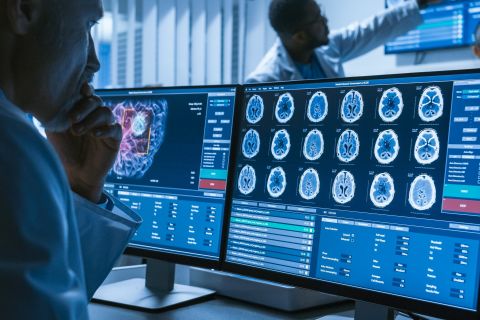Evaluation of UKRI Data to Early Diagnosis and Precision Medicine Challenge
In 2020, an SQW-led consortium was commissioned by UK Research and Innovation (UKRI) to evaluate the Data to Early Diagnosis and Precision Medicine (D2EDPM) Challenge. D2EDPM was one of 23 challenge programmes that were created by UKRI and industry partners to deliver against the aims of the 2017 UK Government Industrial Strategy.
The £210m programme was launched in 2017/18 and completed in 2023/24. It aimed to accelerate the development of data driven healthcare technologies, develop centres of excellence and clusters of digital health and precision medicine focused companies, and increase efficiencies in the NHS.
There were three key strands of activity: (1) genomic sequencing, (2) digital pathology and radiology, and integrated diagnostics, including developing five Centres of Excellence; and (3) a Digital Innovation Hub (DIH) programme delivered by HDR UK. A further £50m of capital was invested by the Office for Life Sciences in three of the Centres of Excellence.
The evaluation involved four phases of work between 2020 and 2023: a monitoring and evaluation framework; a baseline assessment of the Challenge; a process evaluation and a final impact evaluation. The consortium included PHG Foundation, Impact Data Metrics, ADL and IFF Research.
Key findings
The evaluation found that the Challenge made a significant contribution to the development of research and innovation infrastructure and capacity in precision medicine. It delivered a range of new data storage facilities and platforms across the centres of excellence and around 150 national datasets were curated by DIH Hubs. It also enabled the whole genome sequencing of 500,000 UK Biobank participants which helped to maintain UK’s reputation as a global leader in genomics.
The Challenge was a key enabler for significant collaboration across all parts of the precision medicine sector in the delivery of ambitious projects across the three strands of the Challenge. This included bringing together global pharma and sequencing partners in the UK Biobank WGS project, with key lessons now informing other major private-public health data initiatives.
We found that significant progress was made through the Challenge in the development and use of new products and tools. The Centres of Excellence and integrated diagnostics projects delivered a large number of exemplar projects which accelerated the development of new or existing products from proof of concept through to prototyping, product marking and deployment in clinical settings. By the end of the Challenge, 51 AI tools were in development and 18 tools were at deployment phase.
The evaluation also found early evidence of sector growth attributable to the Challenge. For example, some small companies were able to use the Challenge as a platform to secure external investment from both private and public sources, and to grow employment and in some cases sales of their products/services. There were also examples of larger companies reporting growth in R&D activities (i.e. investment and jobs) in the UK which were linked to the Challenge.
Further information
The report is available on the UKRI website here.
For more information on the study please contact John Nolan (JNolan@sqw.co.uk).

